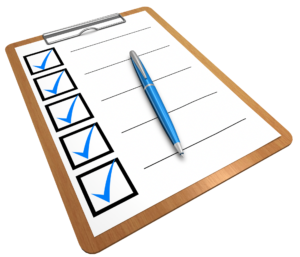
So you’ve secured your visa—congratulations! Now comes the practical part: getting your things across the Channel. Whether you’re relocating from the UK, the US, or any other non-EU country, France requires paperwork to make sure your belongings, pets, and even your car cross the border smoothly.
 You need an inventory
You need an inventory
Every box, every piece of furniture, every item you bring must be listed. Customs will not let your belongings through without one.
Your inventory must be:
- Detailed (“1 x wooden dining table, 4 x chairs, 2 x boxes kitchenware”)
- Bilingual (English/French)
- Signed and dated
- Include a value for each item
💡 Helpful tip: Use a marker pen to number each box and write that number on your inventory. This keeps customs satisfied and makes unpacking easier.
👉 Official guidance: Douane – Transferring your residence
How to get your belongings to France
There isn’t just one way to move your things—what you choose depends on your budget, how much you own, and how hands-on you want to be.
- Full removals service
A UK–France removals company collects everything, manages customs paperwork, and delivers direct to your new home. Stress-free but expensive. - Part-load or shared service
If you don’t have a full house of belongings, many UK–France movers offer “groupage” or shared loads. Your goods share space on a lorry with other clients’ belongings, and you only pay for the space you use. Delivery dates may be less flexible. - Man-with-a-van / shuttle services
A popular choice between the UK and France for smaller moves. Check that the operator is insured and experienced with cross-Channel customs. - DIY move
Hire a van, drive it yourself, and manage customs at the border. This gives you control, but you must have your paperwork in order.
👉 If a removals company carries some of your goods, they will prepare their own inventory for customs. Anything you bring separately in your car or van will need a second inventory in your name.
💡 Note: If you’re moving from another non-EU country (like the US or Canada), the options are similar, but instead of lorries and ferries, you may be dealing with international shipping and container services.
What you can’t take with you
Not everything can come with you when moving to France. Some items are restricted or banned by customs, even if they’re part of your household.
- Plants, soil, and certain seeds – since Brexit, there are strict phytosanitary rules. Bringing plants or even soil in pots is generally not allowed without special certificates.
- Fresh food – meat, dairy, and some other products of animal origin cannot be transported from outside the EU into France.
- Alcohol and tobacco – your household inventory exemption does not cover stockpiles. Only small amounts for personal use are permitted.
- New goods – anything less than 6 months old may be treated as a fresh import and subject to VAT/duties.
- Hazardous materials – including paint, chemicals, fuel, and gas cylinders.
👉 Official guidance: French Customs – Prohibited and restricted goods
💡 Tip: If in doubt, check before you pack. It’s easier than having your box opened and items confiscated at the border.
Bringing pets to France
If your furry family members are coming with you, there are strict rules to follow:
- Microchip – your pet must be microchipped.
- Rabies vaccination – compulsory, given at least 21 days before travel.
- Animal health certificate (AHC) – since Brexit, UK-issued EU pet passports are no longer valid. You’ll need an AHC issued by a vet within 10 days of travel.
- Tapeworm treatment – for dogs only, required 24–120 hours before entry.
- Approved route – pets must enter via authorised points of entry (such as Calais, Eurotunnel, or certain airports).
👉 More info:
💡 Tip: Keep a separate folder for your pet’s paperwork and carry it with you. Pet transport companies can handle the logistics if you’d rather not manage it yourself.
Importing your car – first step
Your car is not part of your household inventory. It has its own customs process.
The key document is the Certificat de dédouanement 846A, issued by French Customs. This proves your car has cleared customs and any duties/VAT are settled. Even if you qualify for exemption (moving residence, owned 6+ months), you still need the 846A to register the vehicle in France.
👉 Learn more:
⚠️ Insurance warning: Most foreign car insurance policies only cover driving in the EU for a limited time (often 90 days). Once you’ve moved, you’ll need to arrange French car insurance as soon as possible—it’s compulsory to have a valid French policy if you’re resident.
👉 We’ll go into car registration—including the certificate of conformity, French car insurance, and the contrôle technique—in the next post.
✅ With your inventory complete, pets prepared, transport arranged, and car paperwork started, your move to France will go far more smoothly—and you can focus on settling into your new life.
 Have you already made the move? Or are you in the middle of the process right now? We know many of our readers have been through this journey, and your experiences could really help others. If you’d like to share your story, tips, or even the hiccups you faced along the way, drop us a line at polife@anglophone-direct.com — we’d love to feature your insights in P-O Life.
Have you already made the move? Or are you in the middle of the process right now? We know many of our readers have been through this journey, and your experiences could really help others. If you’d like to share your story, tips, or even the hiccups you faced along the way, drop us a line at polife@anglophone-direct.com — we’d love to feature your insights in P-O Life.

